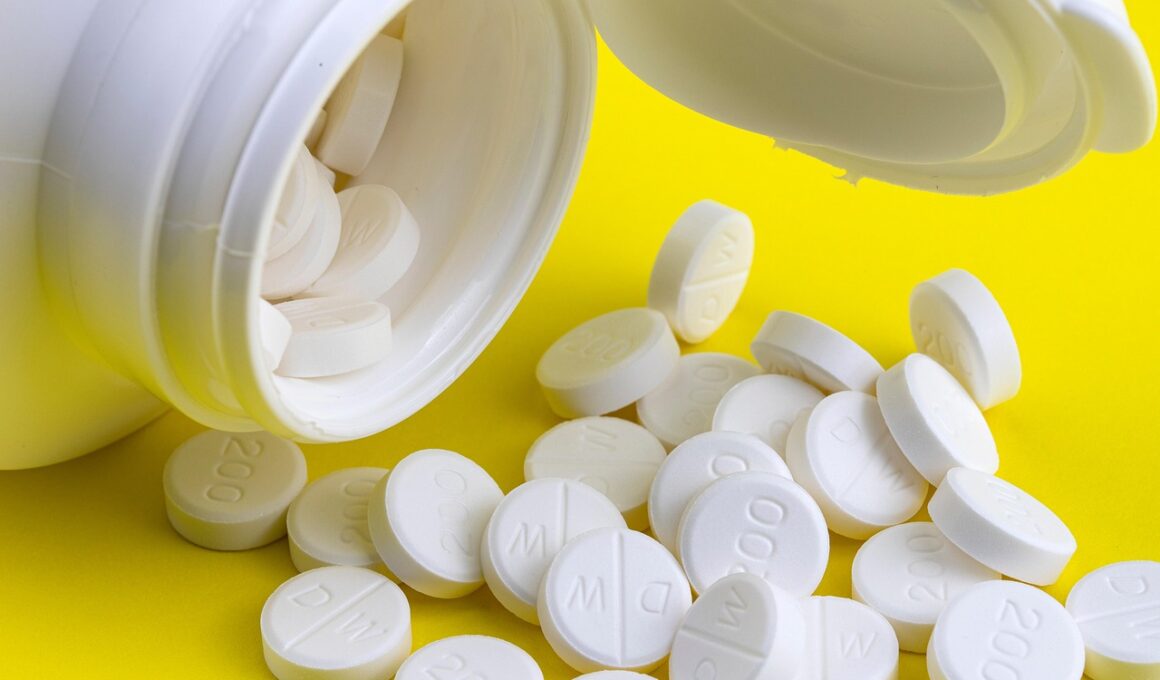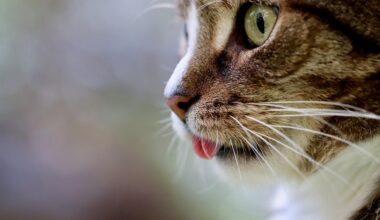Comparing Cat Vitamin Supplement Labels: What Matters Most?
Navigating the world of cat vitamin supplements can be overwhelming due to the varying labels and ingredients. Understanding the nutritional needs of your feline friend is important. Always look for products specifically formulated for cats, as their dietary requirements differ significantly from those of dogs or other pets. When reviewing labels, key elements to scrutinize include the list of ingredients, guaranteed analysis, and the presence of AAFCO statements. Ingredients should be of high quality, indicating they are easily digestible. Ensure that essential vitamins like A, D, E, and B-complex are included in the supplement. Additionally, certain minerals such as calcium and phosphorus support strong skeletal growth and maintenance. To maximize your cat’s health, opt for supplements that include omega fatty acids for a shiny coat and healthy skin. Also, consider the delivery method of the supplement, such as chewable tablets or powder that can be incorporated into food. Ultimately, prioritize products that promote overall wellness while catering to your pet’s specific dietary needs.
Another crucial factor to consider when examining cat vitamin supplement labels is the guaranteed analysis. This analysis provides detailed information about the percentage of crude protein, fat, fiber, and moisture in the product. It’s essential to ensure that the crude protein content is appropriate for your cat’s life stage, whether they are kittens, adults, or senior cats. For example, kittens require higher protein content to support their rapid growth and energy needs. If your cat is predominantly on a dry food diet, a supplement may help balance nutritional gaps. Conversely, if they consume mostly wet canned food, the need for additional vitamins may vary. Reading the guaranteed analysis helps you compare different products and make an informed choice. Furthermore, always check the expiration date on the packaging. Ensuring the supplements are fresh will guarantee that your cat receives effective and beneficial doses. Some manufacturers may even boast third-party testing for potency and purity, providing peace of mind for pet parents regarding the ingredients they are feeding their furry companions.
Understanding Bioavailability and Efficacy
Bioavailability refers to the degree and rate at which a nutrient or active ingredient is absorbed and utilized by the body. In the context of cat vitamin supplements, ensuring that your cat can effectively absorb these vitamins is vital for their health. Select supplements formulated with chelated minerals, which are bound with amino acids, enhancing absorption rates in your pet’s digestive system. Additionally, be mindful of how the vitamins interact with your cat’s existing diet and any medications they may take. For example, certain supplements may interfere with the absorption of specific drugs, potentially diminishing their efficacy. Consulting with your veterinarian before introducing new supplements is generally advisable to ensure they align with your cat’s unique needs. Some products may even highlight their bioavailability benefits on the label. Moreover, the manufacturing process can impact a supplement’s efficacy; therefore, choose reputable brands that adhere to high-quality standards. By understanding these factors, you’ll be better positioned to select supplements that offer significant health benefits for your cat while avoiding costly or unnecessary purchases.
Ingredient sourcing is another important aspect to consider when examining cat vitamin supplement labels. Products made from high-quality, natural ingredients are generally more effective than those using inferior raw materials. Always opt for supplements that clearly state where they obtain their ingredients, whether they’re sourced locally or imported. Transparency in sourcing reflects the manufacturer’s commitment to quality and ethical standards. For instance, avoid synthetic additives, fillers, or artificial flavorings that could compromise your cat’s health. Instead, look for supplements that use whole food sources, which can enhance nutrient density. Additionally, some brands utilize real meat or fish derivatives to provide natural flavors, making it easier for cats to accept the supplement without fuss. Reading labels can help you uncover hidden ingredients or potential allergens. If your cat has any dietary restrictions, it’s critical to ensure the supplement is formulated without these problematic ingredients. Choosing the right supplement means prioritizing quality and asserting a reliable source of vital nutrients to support your cat’s health over time.
Packaging and Storage Guidelines
The packaging of cat vitamin supplements plays a significant role in preserving the integrity of the product. Properly manufactured supplements should come in airtight containers that shield them from moisture, light, and air, which can degrade the vitamins over time. Always check for appropriate packaging with a clear safety seal; this indicates product freshness and safety. Once opened, adhering to specific storage guidelines is crucial. Many supplements should be stored in a cool, dry place away from direct sunlight to maintain potency. Some powders and soft chews might need refrigeration after opening, so be sure to check the label for storage instructions. If you find yourself with leftover supplements, especially if they have passed their expiration date, it’s wise to dispose of them safely to prevent accidental consumption by pets. Staying aware of packaging guidelines and storage methods ensures that your cat receives effective nutritional benefits over time. Thus, always be vigilant about how you store your cat’s vitamin supplements, as it directly impacts their health and wellness.
Consultation with a veterinarian can also guide the selection of the appropriate vitamin supplements for your cat. Every cat is unique, with distinct health needs, dietary habits, and potential deficiencies. A qualified veterinarian can assess these factors and recommend specific supplements that will benefit your cat. They may suggest blood tests to check for deficiencies or imbalances that might necessitate supplementation. Moreover, your vet can outline the proper dosages based on your cat’s age, weight, and health status. It’s essential to openly discuss any pre-existing medical issues, dietary restrictions, or medications your pet may be taking during the consultation. This information will aid the veterinarian in providing tailored advice that ensures the safety and effectiveness of any supplements introduced into your cat’s diet. Moreover, your vet might have insights into the latest research and brands that have proven beneficial, along with their own experiences with various products. Ultimately, working closely with your veterinarian will empower you to make informed choices, enhancing your cat’s health and quality of life.
Final Considerations and Choosing Wisely
In conclusion, being informed about cat vitamin supplement labels is essential for ensuring your feline’s optimum health. Pay attention to the quality of ingredients, guaranteed analysis, bioavailability, and sourcing when making choices that benefit your pet. Consult with your veterinarian for professional advice, and always prioritize safety and efficacy when selecting supplements. This effort allows you to avoid untimely purchases, ensuring that your cat receives the maximum benefits from the products you choose. As you delve into the world of cat vitamin supplementation, remember the importance of balance: supplements should complement a healthy diet, not replace it. Cats thrive on a well-rounded diet and appropriate supplementation based on their unique needs. By following these guidelines and staying well-informed, you can create a comprehensive health plan for your cat. Lastly, never underestimate the impact that diligent research and thoughtful choices can have on your cat’s wellbeing and longevity. When combined with regular veterinary care, nutrition, and love, the right supplements contribute significantly to an enriched, healthy life.
While making your purchasing decisions, also consider looking for reviews and testimonials from other cat owners. Hearing about others’ experiences with a particular supplement may provide insights that help in your decision-making process. Certain brands have a loyal following, which often points to their effectiveness and overall quality. Additionally, consulting online resources, such as veterinary blogs or dedicated pet health websites, can further inform your understanding of cat vitamins and their role in pet nutrition. As you search for suitable products, take advantage of community discussions, both on social media and pet forums, where fellow cat lovers exchange valuable information. However, be cautious of anecdotal evidence and recognize that every cat is unique. What works for one may not work for another due to differences in health, weight, and age. So, always balance advice from peers with professional veterinary recommendations to find the most fitting supplements for your cat. A comprehensive understanding shaped by various resources will empower you to make informed, beneficial choices for the health of your feline companion.


